I really wish I could change the healthcare system so it would stop burning out so many hardworking doctors and other healthcare providers. I would gladly be out of a job if it meant this soul-crushing medical system cared half as much about doctor satisfaction as it did about patient scores.
But sadly, I know I alone will not change the system. So every day I ask, “How can I help my doctor clients avoid burnout?”
It’s not a magic wand, but what I offer here is a tool to help you better understand your risk factors for burnout based on personality type, and provide recommendations for healthy coping strategies.
My approach is based on the Enneagram Personality System, which has 9 basic personality types (ennea means nine). If you don’t already know your type, you can take the most accurate $12 Full RHETI test – by clicking here. Alternatively, you can read through the descriptions and see which ones best fit you. Even though you will only have one primary personality type, aspects of the other types are present in you to a lesser or greater degree.
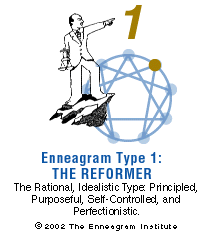 The Reformer/Perfectionist: Posses high standards, wants to do the right thing, disciplined, focused on improvements. Wants to avoid mistakes, can be self-critical, judgmental of others.
The Reformer/Perfectionist: Posses high standards, wants to do the right thing, disciplined, focused on improvements. Wants to avoid mistakes, can be self-critical, judgmental of others.
Risk Factors for Physician Burnout
- Working in an environment where integrity & respect are lacking
- Being obsessive/compulsive regarding charting and tasks
- Feeling guilty when relaxing and not being “productive”
- Having difficulty delegating and trusting others to do a good job
- Having a harsh inner critic
Recommendations: Since you have a very high degree of integrity and care deeply that things are done correctly, you can suffer greatly in a work environment that is not aligned with your values. You may be spending extra time and energy trying to change a system that does not see things as you do. If this is the case and conflict is arising, you may need to find a different approach or a better job fit. You have high standards for your work, including documentation, but if charting is taking an inordinate amount of time, do a trial period of more succinct notes for two weeks. You can always go back to the longer notes, but perhaps shorter notes (with even a few typos) may be acceptable. The Type One has a very strong inner critic, which can be very hard on itself (and others). See how it feels to take on a kinder, more forgiving tone with yourself. There is often a subconscious fear in Ones that if they give themselves a little slack, they will turn into slackers, but this is not a risk! Allow yourself more freedom for guilt-free indulgence, and simple, pure fun.
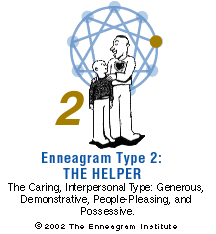 The Helper: Enjoys doing for others and being needed. Warm, compassionate, connecting. Can over-do and get caught in people- pleasing.
The Helper: Enjoys doing for others and being needed. Warm, compassionate, connecting. Can over-do and get caught in people- pleasing.
Risk Factors for Physician Burnout:
- Becoming overcommitted
- Having difficulty saying “No” and setting boundaries
- Allowing others to take advantage of the desire to please
- Losing focus on your own needs and wants
- Being overly empathic and suffering compassion fatigue
Recommendations: You truly enjoy helping others, connecting and seeing how you can meet the needs of others. As a physician, this can put you at high risk for compassion fatigue and burnout from giving too much. Examine your current personal and professional commitments. Where are you being stretched too thin? What can you let go of? Before saying “yes” to additional commitments, press the pause button and consider whether this obligation serves you. Is it something YOU want to do? Take stock of your self-care and personal time. Is all your time going towards work and family, with little left over for you? Try putting yourself first for a few weeks and see how that changes things. To do this, you will likely need to ask for more from others and redefine some boundaries. If others’ needs are so important, why would yours not be just as important?
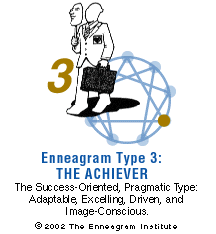 The Achiever: Focused on accomplishments and getting things done. Motivating, efficient, adaptable. Likes to check off boxes and climb the ladder. Image conscious, competitive.
The Achiever: Focused on accomplishments and getting things done. Motivating, efficient, adaptable. Likes to check off boxes and climb the ladder. Image conscious, competitive.
Risk Factors for Physician Burnout:
- Looking to achievement for self-worth
- Being a workaholic
- Losing self in the pursuit of goals/status
- Letting relationships suffer from neglect
- Having difficulty slowing down and just “being”
Recommendations: You excel at setting goals and achieving. You thrive from performing well and having the high regard of others. Doing so can result in career success and a great CV, but it can also leave you feeling empty and disconnected from your heart. Ask yourself what is important about your goals, why do they matter to you? What have you had to sacrifice to achieve your goals? Are there other things more important to you now? As an achiever type, you may have put your feelings aside to reach your goals. Slow down in order to find out what is driving the achievement. Ask yourself if there is something else your heart desires. Even in spite of significant achievement, Threes can have self-esteem issues. A good counter to this is fully accepting who you are, and letting go of comparisons with others. Finding your own authenticity and being comfortable with all aspects of yourself, including your appearance, will create more inner peace than any outer achievement.
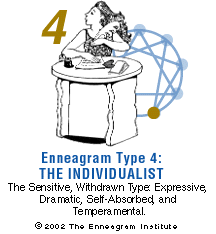 The Individualist/Romantic: Values self-expression, creativity, and finding the deeper meaning. May express universal truths through art, music and writing. Appreciates beauty. Can be moody and overly sensitive.
The Individualist/Romantic: Values self-expression, creativity, and finding the deeper meaning. May express universal truths through art, music and writing. Appreciates beauty. Can be moody and overly sensitive.
Risk Factors for Physician Burnout:
- Working in an environment that is a mismatch for your True Self
- Being hypersensitive to criticism, feeling shame from mistakes
- Being prone to moodiness, melancholy, depression
- Becoming quickly dissatisfied with accomplishments, circumstances or people
- Allowing emotions to get in the way of staying on task, not being disciplined
Recommendations: You are highly creative, intuitive, and seek meaning and connection in your work. As you like to express your ideas and unique approach, a work environment that is too confining and does not value your individuality will not be a good fit. Having a job primarily for income will not be sustainable. Look for ways to custom tailor your work to match you. Allow yourself time for creative pursuits in your personal life: writing, music, interior design, acting, cooking, etc. If your emotions are getting in the way of finishing more mundane jobs such as charting and completing projects, schedule specific times for these tasks. Melancholy is not uncommon for this type, but if you find yourself slipping into depression, seek help. See where you can acknowledge the goodness in yourself and what you have created in your life and find satisfaction there, without anything having to be different.
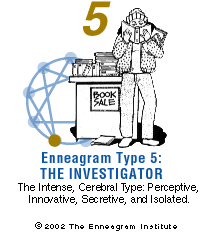 The Investigator/Observer: Tireless learner and experimenter. Perceptive, innovative. More comfortable acquiring knowledge and working with ideas than interacting with others. May feel socially awkward. Likes time alone for thinking.
The Investigator/Observer: Tireless learner and experimenter. Perceptive, innovative. More comfortable acquiring knowledge and working with ideas than interacting with others. May feel socially awkward. Likes time alone for thinking.
Risk Factors for Physician Burnout:
- Excessive patient and staff interactions (strong introversion)
- Having to be in a noisy, busy clinic or hospital setting
- Feeling intellectually stagnant in routine practice
- Avoiding dealing with issues because of emotional content
- Being preoccupied with “what if’s” – worries, scary thoughts
Recommendations: You are an innovator and deep thinker. Your ideal work setting is one where you can focus deeply without interruptions and work independently in your areas of interest. A clinic setting with high patient volume, interruptions, and too many routine cases is going to burn you out quickly. Diversifying patient care with research, teaching, and projects can be helpful. Try to find a quiet place to do your work and ask others to minimize their interruptions. Wealth and prestige are not huge motivators for you, but internal success is. You do what you do because it fascinates and intrigues you. If your work is not feeding this need, it may be valuable to reexamine your job.
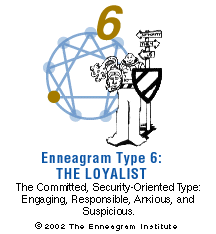 The Loyalist/Questioner: Dependable, hardworking, reliable. Wants to know the rules, do what’s expected. Engaging, loyal. Concerned with security and preparing for the future. Prone to “what if” thinking, self-doubt, and anxiety. ***At least half of my clients are Type 6’s. Very common for doctors.
The Loyalist/Questioner: Dependable, hardworking, reliable. Wants to know the rules, do what’s expected. Engaging, loyal. Concerned with security and preparing for the future. Prone to “what if” thinking, self-doubt, and anxiety. ***At least half of my clients are Type 6’s. Very common for doctors.
Risk Factors for Physician Burnout:
- Over-working and over-preparing in order to exceed expectations
- Worrying about patients and catastrophizing
- Focusing on problems instead of possibilities
- Staying in a bad situation out of loyalty
- Being uncomfortable with uncertainty
- Second guessing decision making
Recommendations: You excel in organizations due to your hard work, problem-solving abilities, people skills, and desire to exceed expectations. Patients often remark that you are great at explaining complex medical information in a very understandable way. You easily over-work yourself, so set healthy limits on your own expectations and set boundaries in your work environment. Because anxiety and self-doubt can be an issue, make a realistic assessment of your abilities and have more confidence in your own decision-making capacity. Try to avoid spending unnecessary time second-guessing yourself and asking other’s opinions. Pay attention to how often you are worrying about the future. See what you can take care of in the moment to relieve your anxiety, and counter the habit of perseverating. Trust that you have the resources, both internal and external, to meet what the future holds. This trust can help you move forward if you need to face uncertainty in order to make positive changes.
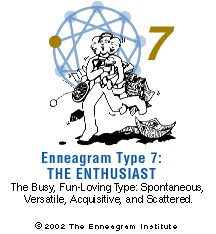 The Enthusiast/Adventurer: Optimistic, quick thinker, social, multiple interests and activities. Resists limits. “Bright shiny object syndrom.” Can become easily bored, scattered.
The Enthusiast/Adventurer: Optimistic, quick thinker, social, multiple interests and activities. Resists limits. “Bright shiny object syndrom.” Can become easily bored, scattered.
Risk Factors for Physician Burnout:
- Becoming bored from limitations of routine practice
- Being impatient and seeking adventure can lead to impulsive decisions, risk taking
- Getting scattered from too many spinning plates
- Becoming dissatisfied with present, focusing on future
- Avoiding underlying feelings by keeping busy
Recommendations: You are a glass is half full kind of person and bring energy, high spirits, and a sense of adventure and fun to those around you. You will do best in a work environment with a lot of variety, stimulation, and interaction with others. Jobs where you can take on new projects and then move on, such as consulting, or jobs with excitement and the fast pace of the ER are good options. If you’re feeling bored in your career, take time to understand yourself and your needs before leaping into something else. Be careful not to overload yourself with so many activities that you get scattered, impatient and drained. The desire for adventure and excitement, can be a way to avoid dealing with underlying feelings and issues. Slowing down an focusing on the present
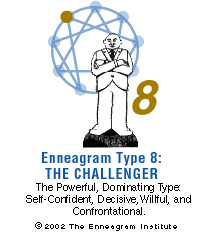 The Challenger/Leader: Assertive, big energy, likes to be in control, lead others. Entrepreneurial, may be a risk taker. Will suffer in order to protect others. Not overly concerned with others’ opinions. Avoids showing vulnerability and softer side.
The Challenger/Leader: Assertive, big energy, likes to be in control, lead others. Entrepreneurial, may be a risk taker. Will suffer in order to protect others. Not overly concerned with others’ opinions. Avoids showing vulnerability and softer side.
Risk Factors for Physician Burnout:
- Pushing beyond healthy limits, overworking
- Getting into conflict/power struggles
- Not wanting to show vulnerability, not seeking help
- Taking risks that jeopardize financial stability
- Making decisions when in a reactive mode versus taking time to process emotions
Recommendations: As a Type 8, you like challenges, autonomy, truth, and being able to be your own boss. You may be in a surgical subspecialty and or have a leadership role. You are no stranger to hard work, and may put in longer hours than your colleagues. However, know that you’re human too, and need rest and healthy limits. Take a look at your weekly schedule. Are you overdoing it? Is there any downtime? Try to understand what is driving you to push yourself so hard. What do you want to achieve from your efforts? If you tend to be overly self-sufficient, see where you might allow others to meet some of your needs and provide support for you. There may be times when you are feeling passionate about something, but others may interpret this as anger. A rousing discussion to you could feel like an argument to someone else. If you are experiencing conflict with others, it could be helpful to hear their perspective and solicit feedback.
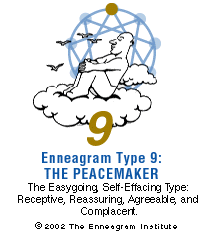 The Peacemaker: Grounded, calm, agreeable. Goes-with-the-flow and keeps peace at any cost. Able to see all sides of a situation. Patient. Non-confrontational.
The Peacemaker: Grounded, calm, agreeable. Goes-with-the-flow and keeps peace at any cost. Able to see all sides of a situation. Patient. Non-confrontational.
Risk Factors for Physician Burnout:
- Putting others needs, wants, and preferences first
- Failing to advocate for self by being conflict avoidant
- Having difficulty knowing what you really want
- Procrastinating, escaping reality (reading/TV, etc)
- Discounting your value, selling yourself short
Recommendations: You bring a calm, accepting energy to your workplace and like to be in a comfortable environment where you feel connected to others and valued. You listen deeply and have a gift for seeing things from someone else’s perspective without judgment. These are great things, however your adaptability and sensitivity to others can cause you to lose sight of your own needs and wants. Often there is something you need to express or ask of someone else, but you discount its importance or do not want to stir up conflict. Try writing out exactly what you want to say or ask for, whether it is to your boss, spouse, colleague or friend. Find a diplomatic way to then address the issue. It is important for you to know that you can have a voice and express yourself. As a type 9, you may be staying way too long in a job that you don’t like. Inertia can take over and days can turn into years. Procrastination is rarely due to laziness. There is usually some underlying fear, concern, or false belief that is maintaining the status quo. Give yourself a pinch, set a deadline for action, and know that when you align with your own inner driver, you are unstoppable.
Something you may already be realizing about these different types is that they each have unique qualites and gifts. Expressing these gifts bring a lot of satisfaction and success to each type. However, when a gift is overdone, such as being a helper type, it becomes a liability.
The Enneagram helps us to see our gifts and own them, but also understand the subconscious drivers that can cause us to “over-do” our gifts so they don’t become liabilites.
The Enneagram is not here to put you in a box, it is here to help you get out of a box you may have put yourself in by thinking you have to be a certain way.
Viva la freedom of being you – out of the box!
Want to learn more?
Take the RHETI Enneagram Personality Test – $12 takes 35 – 40 mintues
Podcasts:
Books:
The Wisdom of the Enneagram by Riso and Hudson
The Career Within You: How to Find the Perfect Job for Your Personality Type, by Wagele and Stabb
The Enneagram: 9 Gateways to Presence by Russ Hudson – Audio Course
Latest Posts
Find what you're looking for:
Popular Categories:
Career Change | Career Enhancement | Job Search | Personal Development
10 Comments
Leave a Comment























What a great read! Thank you for introducing me to the enneagram and associated tips to help avoid burnout. I plan to apply much of this advice immediately.
Thank you so much Jeff! You made my day. I am really glad that you enjoyed the post and feel that the advice will be useful for you. Please feel free to report back to us when you’ve had the chance to test drive some of tips! Feedback is always welcome. All the best to and thanks again for reading.
Heather, thank you for your advice and specifically the enneagram. I am a retired and looking for a new activity.
I publish two blogs, Digital Health Space and Health Train Express (for over ten years).
Thank you so much for comments Gary! I checked out your blogs – they are both filled with excellent content. How do you write so prolifically!??
[…] If you would like recommendations for burnout based on your Enneagram Personality Type, you can read them here. […]
As an 8 in the mental health and addictions field in a hospital, setting i can relate wholeheartedly to your comments. I tend to like doing excess. Have for years. Time to retire at 67 to spend more time with family, rest and slow down while I have my health.
If your readers want to see a panel of their type go to utube and look for Beatrice chestnuts panel presentations using volunteers within each type. The enneagram comes alive. With wisdom and personal sharing. A brilliant system for helpfulness over the years.
I don’t seek help easily or allow vulnerability. Try to avoid sparring or being dominating. Listen to others truth than refuting. My growth work. Excellent summary on the topic of burnout. Thank you Gary.
Gary, thank you so much for taking the time to read and comment on this blog. I have a lot of respect for Type 8’s! They often have what seems like superhuman energy levels and the capacity to move and empower others in profound ways. It sounds like you have a lot of self-awarenes and I’m glad you are going to take more time for yourself and family. Your recommendatino of Beatrice Chestnut’s panel presentations is an excellent one! I just had a look at the panel for the 6’s ( as so many physicians are 6’s) and I like her approach and how she was describing this type. I”m excited to watch more and recommend her Youtube panels. Thank you for sharing. Much appreciated.
Optometrist practicing in high pathology academic ophthalmology practice. 10th year of practice. Probably at the worst stage of burnout since I started practicing. I’m a textbook INTJ and #5 according to your Enneagram traits listed above. The thing that makes my current practice burn me out so bad is that I don’t have a dedicated technician. So I have to work up all my patients solo (note: most of my encounters will require pupil dilation and this means that I essentially have to see nearly every patient twice).
Only about 10% of my practice is routine, the rest are mostly 80+ year old patients with dementia, orientation and mobility issues, advanced glaucoma, diabetic retinopathy, and various stages of macular degeneration. I’m the only black doctor male doctor in a department of about 50 ODs and MDs, so I feel like I have to “play the part” down to the T to maintain my stellar patient satisfaction score, when other extrovert docs pretend like they can’t keep up.
I’m burned out as sh*t. Truly in the wrong field. My brain is too fried to persevere through another degree. I’m at the point where despite being very effective with patients and a great clinician, I’m sick and tired of working in an environment where I can’t think or process random and/or creative thoughts. All my attention is on fixing the patient, running on time, answering questions, and typing in EPIC.
Hi Eric, it does sound like you are really, really burned out. I’m truly sorry to hear this. I have been going to the ophthalmologist recently, and have been wondering how those in this field deal with having to look in the eye all the time and have such a focused area of practice? I’m sure you get asked the same questions over and over. Being a type 5 on the Enneagram certainly can make it challenging to see a lot of patients and have multiple interactions all day long. I can understand how you are very frustrated with your current work arrangement. Seeing so many patients and having to be on the computer and talking to patients and multitasking can be draining even for extroverts. I hope you can take some time to figure out what will work better for you. Don’t lose hope. Keep us posted. May 2021 bring some positive changes for you.
Eric,
I found your comment because I’m also a textbook INTJ/Enneagram 5. I cringed at your description of your workplace. Do you and your colleagues ever discuss your personality profiles and how they relate to your work environment? I have found it very cathartic, and you might try it. It will allow your peers to see how cerebral your outlook on the world is (which they will respect), and they may even begin to look to you for insight on their own workplace issues. Nothing pumps up an INTJ like analyzing issues and effective problem solving.